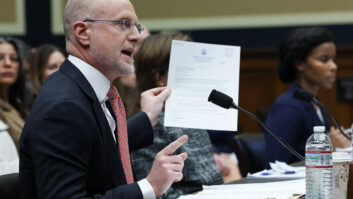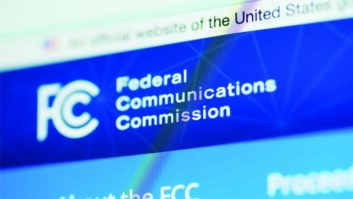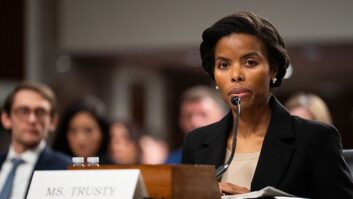State broadcast associations are telling the Federal Communications Commission that its planned increase in regulatory fees will be harmful to radio and TV stations at a time when many stations face “an increasingly precarious situation.”
They also want the commission to start a proceeding that would lead to fees being allocated more fairly across industries that benefit from the FCC’s work.
[“Broadcasters Face Higher FCC Regulatory Fees”]
The leaders of several associations met via tele-conference calls last week with staff members of three FCC commissioners. The associations include those in Indiana, Minnesota, Georgia, Montana and Missouri.
The state groups echoed arguments that have been made to the FCC — so far without success — by the National Association of Broadcasters.
The associations described financial challenges facing broadcasters, especially those in small markets, where stations may be the only source of local news and information as well as a balance to misinformation on social media.
According to ex parte filings summarizing the calls, the associations complained about increases of “double-digit percentages year over year” and said that the FCC’s published Broadcast Totals “show a loss of at least 122 full-power commercial AM and FM radio stations since 2019, demonstrating the increasingly precarious situation many stations face.”
They also noted that the FCC’s most recent auction failed to attract a bidder for any of the offered AM station authorizations and for a third of the FM station authorizations.
This, they said, “further confirms an increasingly obvious fact: that the FCC’s proposal to charge broadcasters 16% of its operating costs while those same broadcasters hold only 0.07% of the spectrum regulated by the commission is an unsustainable approach to funding the commission’s operations.”
They also said that the fee increases “are due almost entirely to the commission’s decision to treat its work under the Broadband DATA Act as commission ‘overhead,’ to be spread across all FCC regulatees despite the fact that broadcasters have no connection to, and do not benefit from, that work in any way.”
That, they say, is contrary to the will of Congress.
“The commission’s traditional license-centric approach to setting regulatory fees is neither legal nor sustainable,” the associations wrote in their filings.
They said that approach “merely forces broadcasters to subsidize through excessive regulatory fees their fiercest competitors: social media and technology companies that consume vast amounts of the commission’s time and resources while paying no regulatory fees whatsoever.
“This subsidy is particularly offensive when some of these resources broadcasters are paying for are being used to encroach on broadcaster’s spectrum through unlicensed uses, reducing the ‘benefit’ of that spectrum to broadcasters while simultaneously benefitting technology companies who conveniently avoid having to pay for the cost of those proceedings since they are not an FCC licensee.”
The associations told FCC staffers that current law now requires it to diversify its portfolio of regulatory fee payors.
They want the commission to start a proceeding to examine how to bring its regulatory fee processes into compliance by expanding the universe of regulatory fee payors and acknowledging that the amount of fees must be governed by what is called the “touchstone” of the benefit the commission delivers to the payor.
[Read one of the ex parte summaries as filed with the commission.]







